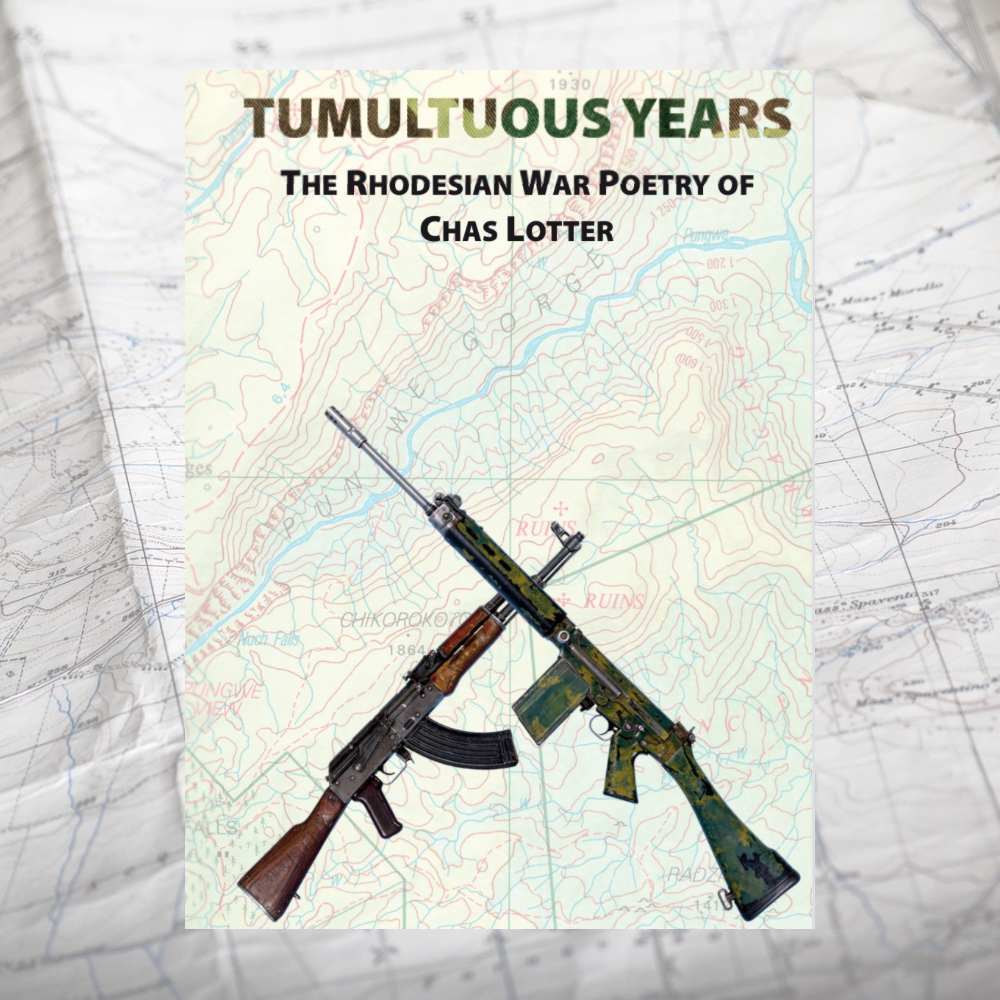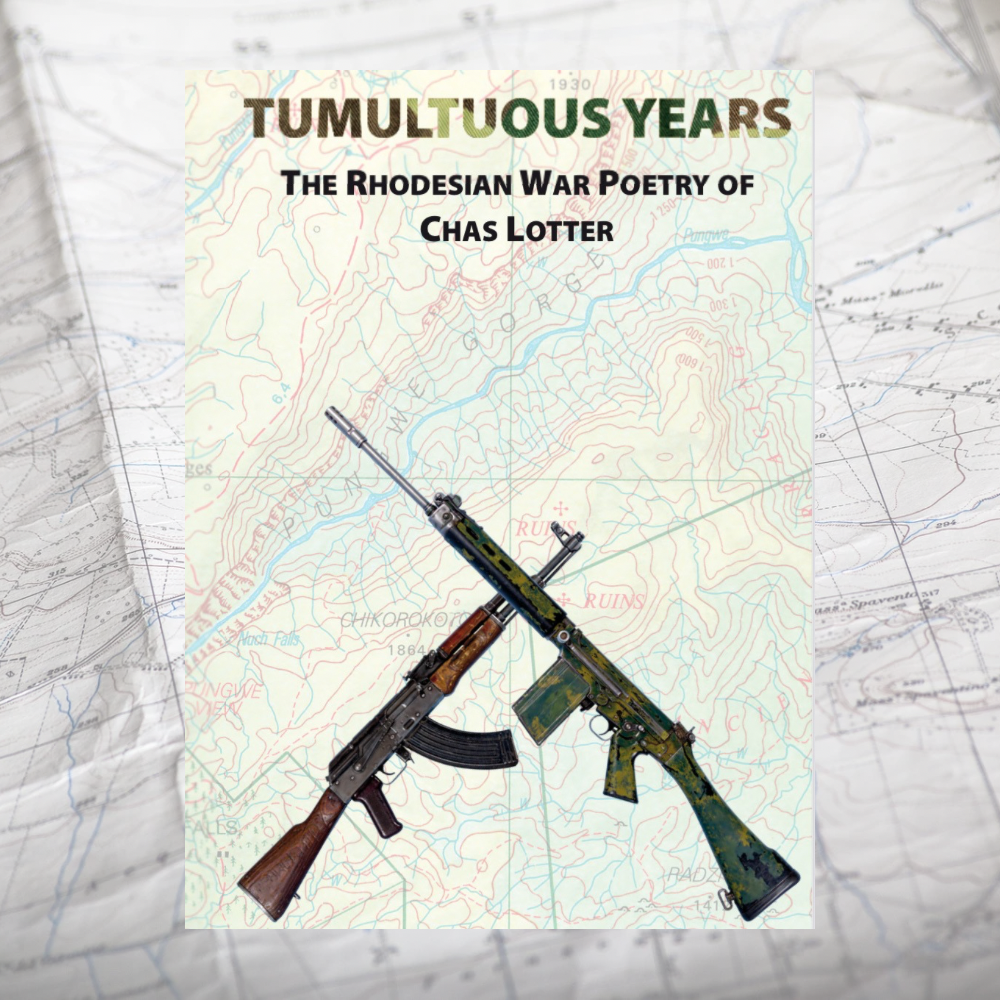G5 Books
Pre Order: Tumultuous Years, Chas Lotter
Pre Order: Tumultuous Years, Chas Lotter
Couldn't load pickup availability
Tumultuous Years is the fruit of one man’s experience of a bitterly contested conflict. It brings together, in one volume, all the poems written by Chas Lotter, a man who served as a medic in the territorial force of the Rhodesian Army in the war that gave birth to independent Zimbabwe in 1980. The hostilities may have ceased many years ago, but the memory of those days of violence remain raw and continue to be felt in contemporary Zimbabwe.
This new collection is a significant addition to Lotter’s publishing record. From his first war poem contributions to the journal Two Tone in 1977, Lotter’s poetic reach expanded rapidly. He collaborated with the Rhodesian artist Peter Badcock to produce two illustrated collections: Shadows of War (1978) and Faces of War (1980). Some years later, he produced two stand-alone collections of his own: Rhodesian Soldier and Others Who Fought (1984) and Echoes of an African War (1999).
Tumultuous Years differs from Lotter’s previous publications in several important respects. Whereas Lotter’s previous collections had fulfilled particular editorial briefs and were products of their time, the guiding principle behind this collection has been to construct as complete a record of Lotter’s war poetry as possible, largely for the benefit of future readers and researchers. Unlike Lotter’s previous stand-alone collections (Echoes of an African War in particular), there is no implied narrative design and although there are some illustrations, these occupy a secondary role and are not intended to supplement the texts as a visual commentary.
The poems are arranged in chronological order, and the text is supported by a comprehensive chronology, a glossary and footnotes intended to give context and decode Rhodesian army patois, as well as clarifying other relevant issues.
Lotter’s sometimes prodigious output does not lend itself to comfortable characterisation. Thematically, it has resonances with some of the well-known war poets (Wilfred Owen and Siegfried Sassoon in particular) of the previous century, but there is no neat progression noticeable in his work from a pro to an anti-war position. What becomes apparent is that long after the war ended, Lotter continued to explore the experience.
The creative act of writing proved cathartic for Lotter and as readers explore his work, they are confronted with multifaceted poems that sometimes adopt vacillating positions and reveal, in parts, a man of baffling contrasts who evades any neat attempt at socio-political labelling. Lotter is just as likely to offend supporters of white Rhodesia as to outrage ardent supporters of the liberation struggle. Lotter’s poetry is the product of his complex, quixotic nature and makes sometimes heavy demands on readers. An autodidact and outsider, he holds strong views. He writes in his own confident style, unhindered by concerns of either praise or criticism. Reading through this collection, one becomes quickly aware that there are moments of quietness and simple beauty, but there are also pieces that roar with rage and others that leak malevolence. There are instances of deepest pathos and others of unspeakable savagery. Lotter’s pen inscribes the vivid memory of all these emotions and experiences with conviction.
Collectively, these poems form a remarkable cultural record that in scope and volume seals Lotter’s reputation as the Rhodesian soldier poet of the war. The lived experience for white Rhodesians was a period when otherwise ordinary people were confronted with situations they seemed incapable of fully comprehending and which would, through political blundering and bombast, spiral into a terrible conflagration that tested their courage, their characters, their values and resolve beyond any imaginable limits. Lotter’s venting of these raw emotions resonates in the latter part of the collection, yet at no point does Lotter beg the reader’s sympathy or indulgence.
Lotter may not have suffered physical injury during his time under arms, but the post-traumatic stress disorder he experienced is laid bare here in excruciating detail. The ultimate strength of Tumultuous Years is that it is neither consumed by bitterness and recrimination nor preoccupied with thoughts of ‘what if’ scenarios. Yet he does not profess to the familiar paradigm of ‘finding closure,’ nor does he trumpet any mystical spiritual awakening or conversion to a radically refashioned political outlook. He has eschewed violence and is now a committed pacifist with strong humanist values. His thoughts and opinions retain something of the brittle, nonconformist edge of his outsider character.
Share


